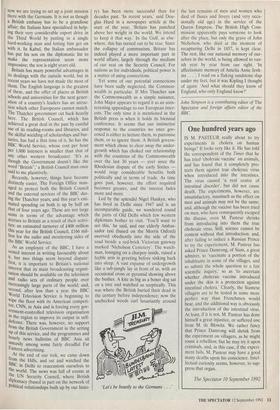One hundred years ago
IS M. PASTEUR really about to try experiments in cholera on human beings? It looks very like it. He has told the correspondent of the Times that he has tried 'choleraic vaccine' on animals, and has found that it completely pro- tects them against true choleraic virus when introduced into the intestines. The virus caused 'a real centre of intestinal disorder', but did not cause death. The experiments, however, are unsatisfactory, inasmuch as the effect on men and animals may not be the same; and, although the vaccine has been tried on men, who have consequently escaped the disease, even M. Pasteur shrinks from introducing into them the true choleraic virus. Still, science cannot be content without that introduction; and, after failing to induce a Russian Prince to try the experiement, M. Pasteur has asked Prince Damrong, of Siam, a great admirer, to 'vaccinate a portion of the inhabitants in some of the villages, and so submit the whole question to a fair scientific inquiry,' so as `to ascertain whether choleraic vaccine introduced under the skin is a protection against intestinal cholera.' Clearly, the Siamese villagers are to be tested in some more perfect way than Frenchmen would bear, and the additional way is obviously the introduction of the intestinal virus. At least, if it is not, M. Pasteur has done himself a great injustice, or suffered one from M. de Blowitz. We rather fancy that Prince Damrong will shrink from the experiment on villagers, as he might rouse a rebellion; but he may try it upon criminals, and, in this case, if the experi- ment fails, M. Pasteur may have a good many deaths upon his conscience. Intel- lectual curiosity seems, however, to sup- press that organ.
The Spectator 10 September 1892


































































 Previous page
Previous page